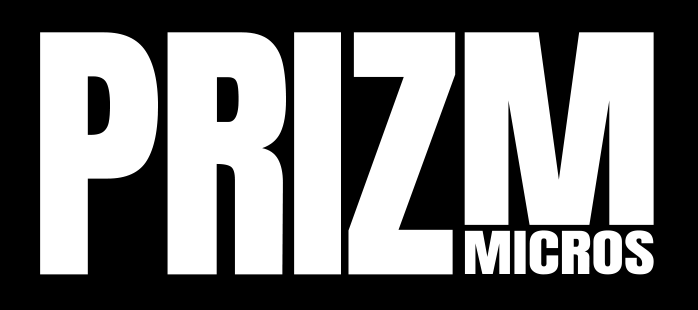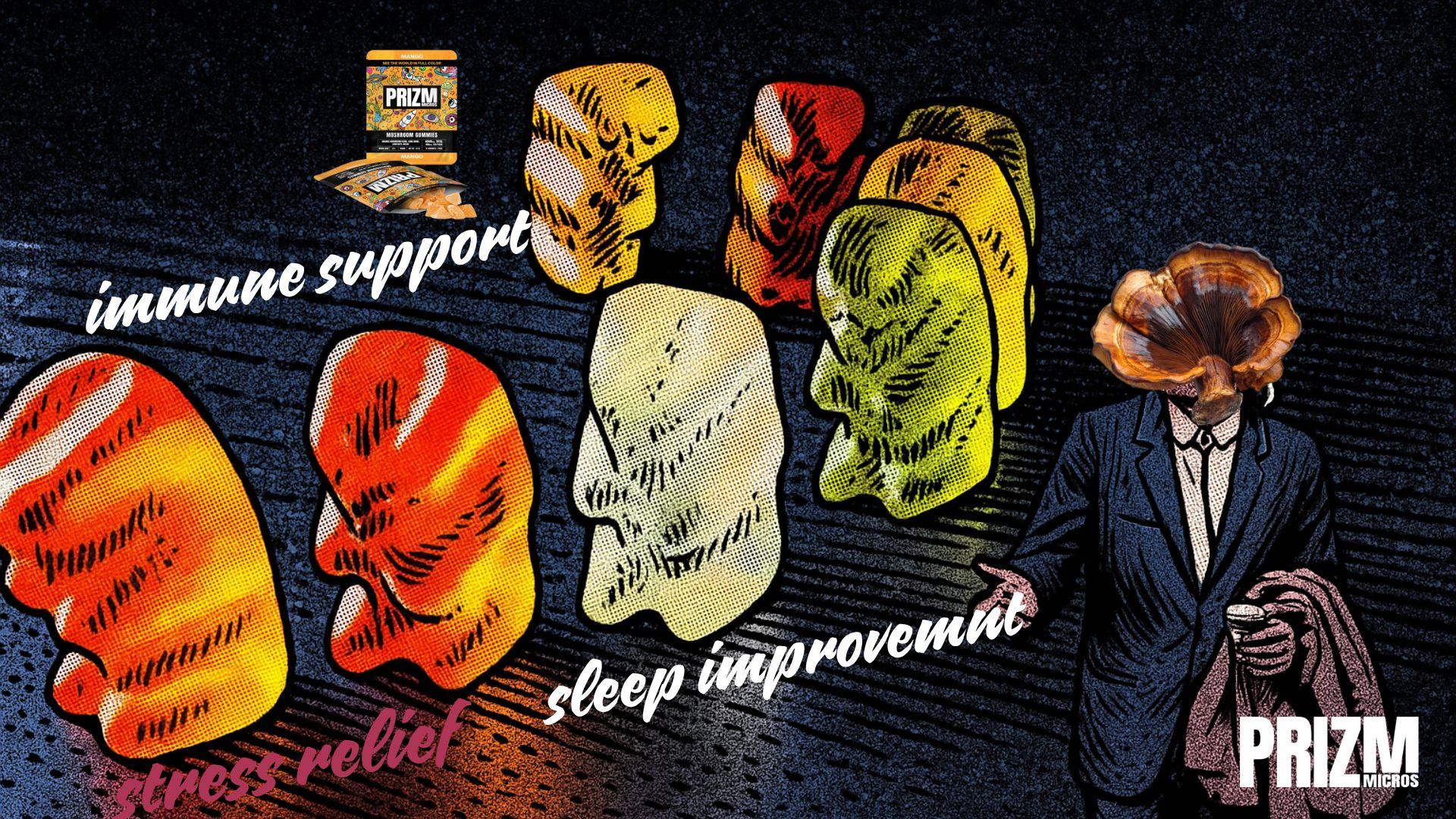Reishi gummies are adaptogenic supplements designed to support stress relief, deeper sleep, immune health, and mood balance. They work gradually by modulating cortisol levels and enhancing the body’s resilience, without causing drowsiness or psychoactive effects.
What Do Reishi Gummies Actually Do? A Functional, Feel-Good Guide
If you’re here, you’re probably wondering: What’s the big deal with Reishi gummies? Are they legit or just another trendy “natural” thing that ends up collecting dust in your wellness drawer?
Let’s cut the fluff.
Reishi (that’s Ganoderma lucidum, for the mycology nerds) isn’t new. It’s been a staple in Eastern medicine for centuries, used for stress, sleep, and longevity. But the gummy format? That’s the 2020s twist we love: no bitter teas, no chalky capsules, just functional, snackable support for your mood, mind, and immune system.
In this article, you’ll learn:
- What makes Reishi such a powerhouse (and why your body might thank you)
- What Reishi gummies do differently (hello, taste and timing)
- How to know if they’re working, and what to watch out for
- Why PRIZM built theirs for chill, not placebo
Whether you’re looking for better sleep, a calmer vibe, or just tired of chasing caffeine highs that crash, we’ll break down the science, the real-world experiences, and how to make Reishi work for you. Let’s get into it.
The Core Benefits of Reishi Gummies (and Why People Swear by Them)
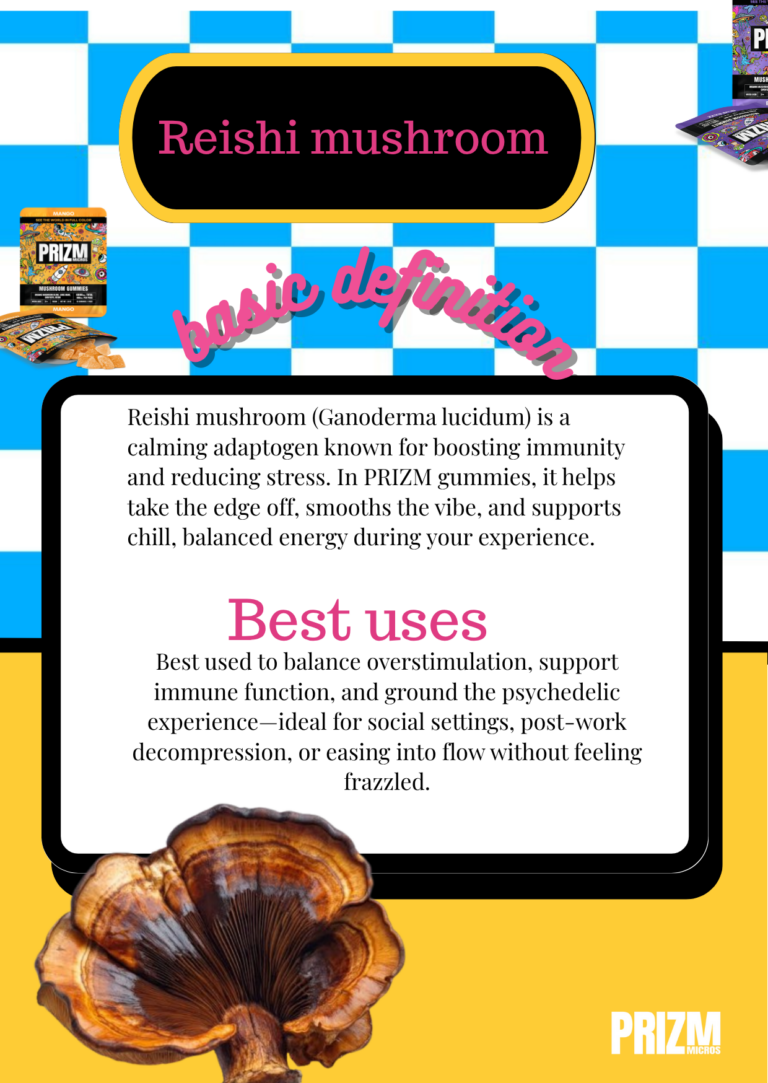
So, what do Reishi gummies actually do? Here’s the short version: they help your body chill, recover, and stay balanced. Think of Reishi as nature’s calm-down button, but one that works overtime behind the scenes on your stress levels, immune system, and even sleep cycle.
Stress Less, Chill More
Reishi is an adaptogen, which means it helps your body adapt to stress, physical, emotional, or environmental. Instead of numbing you out, it subtly smooths the edges of anxiety by regulating your cortisol levels and supporting your HPA axis (that’s your stress response system). Users often describe the vibe as “calm but clear,” not sedated.
Sleep That Actually Works
Many people take Reishi in the evening to wind down. It’s not a knockout punch like melatonin—it’s more of a nervous system whisper. Reishi interacts with GABA pathways in your brain to promote a deeper, more restful sleep. Some folks even report vivid dreams (we’ll get into that later), but for most, it means falling asleep faster and waking up less groggy.
Immune System MVP
Reishi’s polysaccharides and triterpenes are immune modulators. Translation? They don’t “boost” your immune system like a sugar rush. They help balance it, ramping up defenses when needed and calming inflammation when it’s not. For those who get sick often or feel run-down, this steady support can be a game-changer.
Other Hidden Bonuses
- Mood stability: Many users notice more emotional balance over time, less up-and-down, more grounded energy.
- Energy without the crash: Reishi offers what some call “subtle, sustained energy.” It’s not like coffee; it’s clarity without the jitters.
- Liver & blood sugar support: Early research links Reishi to improved liver detox and blood glucose regulation, bonus points if you’re balancing carbs or cutting sugar.
- Skin & gut health: Thanks to its anti-inflammatory profile, some users see clearer skin and calmer digestion over time.
Bottom line? Reishi gummies don’t just make you feel chill, they quietly support your whole system, helping you show up more fully, day after day. And when taken daily, the benefits start stacking.
How Reishi Gummies Work (and Why the Gummy Format Matters)
Let’s talk mechanics, without going full lab coat.
Reishi works through a mix of bioactive compounds: polysaccharides (immune modulating), triterpenes (anti-inflammatory), and beta-glucans (cellular defense). These interact with your body’s stress, immune, and sleep systems to restore balance. But none of it matters if your body can’t absorb them, which is where the format makes a big difference.
“Reishi’s benefits aren’t just anecdotal. A 2020 review in the Journal of Ethnopharmacology highlighted its potential to modulate the immune system and reduce fatigue through bioactive compounds like triterpenes and polysaccharides. We formulate with these findings in mind, backed by science, not just stories.”
Why Gummies Beat Capsules and Powders (Sometimes)
- Faster absorption: Gummies begin breaking down in the mouth and stomach, offering more efficient uptake of Reishi’s actives, especially if they use dual-extraction (alcohol + water) for both triterpenes and polysaccharides.
- No taste aversion: Reishi powder is famously bitter (like dirt and espresso had a baby). Gummies bypass the taste completely, making daily use enjoyable, not a chore.
- Convenient + precise dosing: Each gummy is pre-measured, eliminating the guesswork of scoops or droppers. For busy users, this consistency is a game changer.
What “Good” Reishi Gummies Are Made From
Not all Reishi is created equal. The gold standard?
- Fruiting body extract (not mycelium on grain)
- Dual-extracted (water + alcohol to unlock full spectrum of benefits)
- Standardized beta-glucan and triterpene content
- Pectin-based (not gelatin) and free from artificial colors or flavors
If a product doesn’t mention these? It’s probably not strong enough to do anything noticeable, aside from lightening your wallet.
Why PRIZM Does It Differently
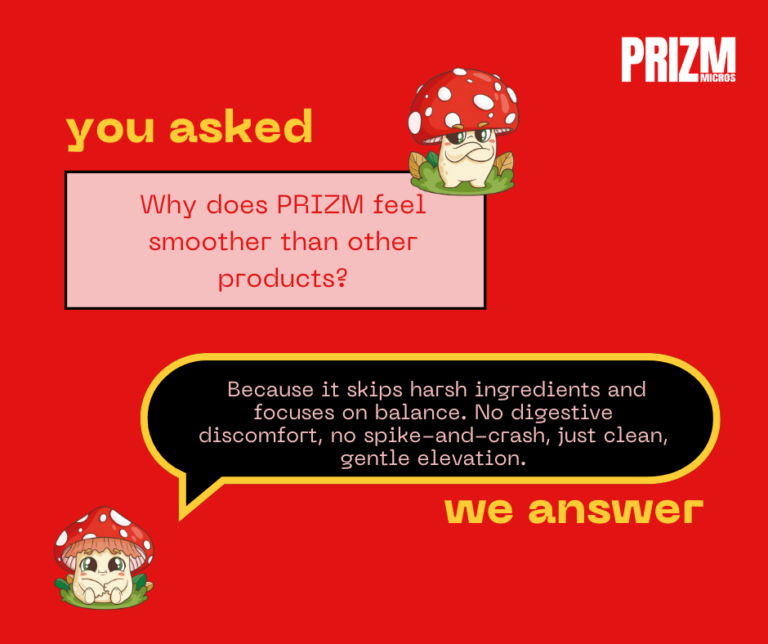
At PRIZM, we’re obsessed with experience and efficacy. Our Reishi gummies aren’t just functional—they’re flavorful, bioavailable, and third-party tested to back the buzz. Every dose is dialed for daily calm, crafted with the same care we put into every PRIZM blend. Legal doesn’t mean lame—and this is how we prove it.
What Reishi Gummies Actually Do (And Who Feels It Most)
Let’s get to the big question: what do Reishi gummies actually do for your body and brain? Here’s the short answer, they help you feel more balanced, less stressed, and better rested. But the long answer? That’s where things get good.
Stress Reduction Without Sedation
Reishi is one of the most trusted adaptogens in traditional Chinese medicine—known for modulating the HPA axis (that’s the stress control center in your body).
- Helps regulate cortisol levels
- Promotes calm without drowsiness
- Smooths emotional highs and lows, especially during intense weeks
This makes it ideal for entrepreneurs, parents, students, anyone riding the rollercoaster of daily life.
Immune Support That Builds Over Time
Reishi’s beta-glucans and triterpenes signal the immune system to balance, not just stimulate. This means:
- Better resistance to seasonal bugs
- Faster recovery when you do get hit
- Immune vigilance without overstimulation
No, it’s not a cure-all. But it helps your body be less reactive—and more resilient.
Sleep, Mood & Brain Gains (Yes, Really)
- Better sleep quality: Reishi calms the nervous system, helping you fall asleep faster and sleep deeper. Some users even report more vivid dreams.
- Stable energy: Not a jolt, but a sustainable hum. Many report fewer afternoon crashes and less reliance on caffeine.
- Mood lift: Reishi may reduce inflammation-linked mood swings and enhance emotional clarity—especially helpful during hormonal cycles or burnout phases.
Bonus: when paired with Lion’s Mane, Reishi acts like the grounding yin to Lion’s Mane’s stimulating yang—creating a calm-focus combo that feels amazing in high-stress environments or work modes.
Brian’s side notes: “When my brother Ryan and I first explored mushroom wellness, we weren’t chasing trends—we were helping family. Watching our brother-in-law benefit from microdosing during chemo opened our eyes. Reishi wasn’t just calming—it gave him the emotional grounding he needed. That experience still fuels every batch we make.”
How Long Reishi Gummies Take to Work (And What “Working” Feels Like)
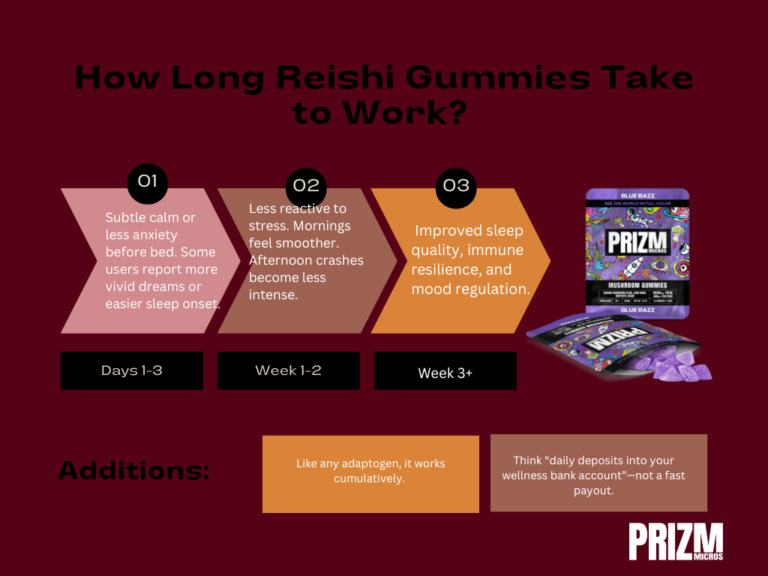
Let’s bust a common myth—Reishi isn’t like caffeine. You won’t feel a jolt. You feel better. Over time. Here’s what to expect:
The Timeline of Reishi Effects
- Days 1–3: Subtle calm or less anxiety before bed. Some users report more vivid dreams or easier sleep onset.
- Week 1–2: Less reactive to stress. Mornings feel smoother. Afternoon crashes become less intense.
- Week 3+: Improved sleep quality, immune resilience, and mood regulation. You may notice clearer skin, steadier focus, and more consistent energy.
Like any adaptogen, it works cumulatively. Think “daily deposits into your wellness bank account”—not a fast payout.
What It Actually Feels Like
- Calm but alert—not sedated
- A smoother emotional baseline
- Feeling more like yourself, minus the overwhelm
- A sense of “anchored energy”—you can move fast without feeling frantic
Some users even describe a unique gut-level buzz—a subtle hum of wellbeing, especially when stacked with Lion’s Mane or used as a nighttime wind-down ritual.
Tips for Best Results
- Take consistently—daily is key
- Evening is best for most, but some prefer late afternoon to avoid sleep disruptions
- Pair with food if you’re sensitive to supplements
- Choose quality—fruiting body extracts and third-party tested formulas are essential
Reishi isn’t a one-hit wonder—it’s a daily rhythm enhancer. And when your rhythm is right, everything feels easier.
Not All Reishi Gummies Are Created Equal—What to Look For
There’s Reishi, and then there’s real Reishi. The difference? Everything.
Fruiting Body vs. Mycelium on Grain
Most of the benefits people associate with Reishi come from the fruiting body—the actual mushroom cap and stalk. That’s where you find rich levels of beta-glucans and triterpenes.
Cheaper brands often use mycelium on grain—basically lab-grown roots blended with rice. It’s less potent, lower in actives, and often just filler.
At PRIZM, we use fruiting body extracts only. Because you deserve the real thing—not mushroom-flavored rice.
The Right Extraction Method Matters
- Hot water extraction pulls out immune-boosting beta-glucans
- Alcohol extraction unlocks triterpenes—key for stress relief, liver support, and anti-inflammatory effects
- Dual-extracted = full-spectrum benefits
If it’s not dual-extracted, you’re missing half the magic.
Third-Party Testing Isn’t Optional
Would you eat mystery supplements? Didn’t think so.
Look for:
- Certificate of Analysis (CoA)
- Verified beta-glucan and triterpene content
- Tests for heavy metals, mold, and pesticides
We publish ours proudly. Because transparency builds trust—and PRIZM is built for both.
Ingredient Integrity & Flavor That Doesn’t Suck
Avoid gummies with:
- Artificial dyes or sweeteners
- Gelatin (unless you’re okay with animal-based)
- High-fructose corn syrup
PRIZM’s Reishi gummies? Vegan, pectin-based, and taste like a treat. No bitterness. No chalk. Just a delicious way to dial down stress, day or night.
How Long Until Reishi Works? And Other Real-World Use Tips
Reishi isn’t caffeine. It won’t hit you in 10 minutes with a jolt. It’s more like a shift you notice looking back—“Whoa, I’m handling this better than I used to.”
When Does Reishi “Kick In”?
Most users start to feel subtle changes in 3–14 days of consistent use. This could be:
- Falling asleep faster
- Less reactive in stressful moments
- Fewer afternoon crashes
But like any adaptogen, it works with your system, not against it. Consistency > intensity.
Best Time to Take Reishi Gummies
Evening is a favorite—especially for people seeking better wind-down and sleep.
But some prefer it earlier:
- Afternoon for stress buffering
- Post-lunch to avoid carb crashes
- Before social events for chill clarity
Test and tune. Your body knows.
Should You Take It With Food?
You can, but you don’t have to. Reishi gummies are gentle on most stomachs, and some users say it actually helps with post-meal bloating or sugar dips. Still, if you’re sensitive, pairing with food may ease absorption.
Daily or Cycled Use?
Reishi is safe for daily use. In fact, long-term consistency delivers the biggest benefits. Cycling isn’t necessary unless you’re stacking with other mushrooms and want to reset sensitivity.
How Do I Know It’s Working?
Ask yourself:
- Am I less rattled by stress?
- Am I sleeping more deeply?
- Do I bounce back from challenges faster?
- Does my energy feel smoother—not spiked, just steady?
That’s Reishi doing its thing. Quietly, steadily, and without fireworks.
Why Not All Reishi Gummies Are Created Equal
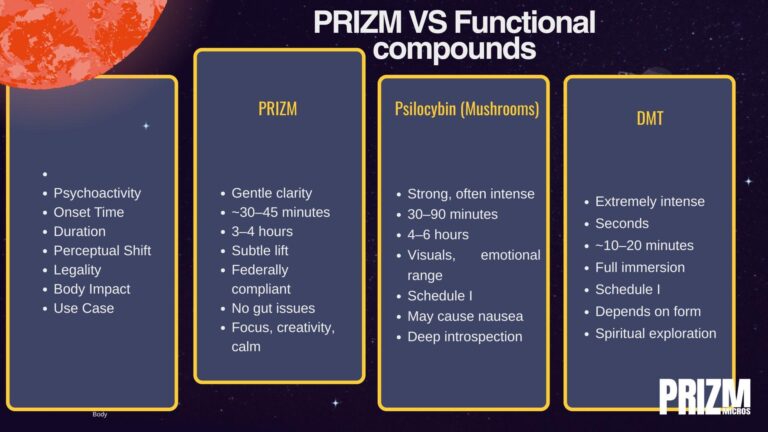
Let’s talk quality—because not all mushroom gummies are legit. Some are basically glorified candy with a sprinkle of powdered hype. Here’s how to spot the real deal.
Fruiting Body vs. Mycelium on Grain
You want the fruiting body—that’s where the heavy-hitting compounds live. Mycelium on grain is cheaper and often diluted with filler. If the label doesn’t say “fruiting body,” it probably isn’t.
Extraction Method Matters
- Hot Water Extraction pulls out immune-boosting beta-glucans.
- Dual Extraction (water + alcohol) is ideal—it also captures the triterpenes that help with stress and inflammation.
Without proper extraction, you’re just chewing on fancy fungus.
Dosage Transparency
Look for:
- How many mg of extract per gummy?
- Extract ratio (like 10:1)?
- Beta-glucan and triterpene percentages?
If the label doesn’t answer these, it’s marketing fluff, not medicinal.
Third-Party Testing & Certifications
Trustworthy brands show their receipts. Look for:
- Third-party tested (with a CoA)
- USDA Organic
- GMP Certified
- Vegan / Non-GMO
No shade, but if your mushroom gummy has artificial dyes and corn syrup… it ain’t built for vibes or science.
PRIZM’s Standard: Clean, Potent, Legal
At PRIZM, we use dual-extracted fruiting body Reishi, lab-tested for active compounds—not mystery blends. Every batch is built for performance, peace of mind, and feel-good function. Because “legal” doesn’t mean lame. It means we care enough to do it right.
Realistic Expectations & How to Use Reishi Gummies Right
Reishi isn’t a Red Bull. It won’t blast you into productivity orbit—or knock you out cold like melatonin. It’s subtle, consistent, and cumulative. Here’s what to expect and how to get the most from your daily dose.
When Reishi Kicks In
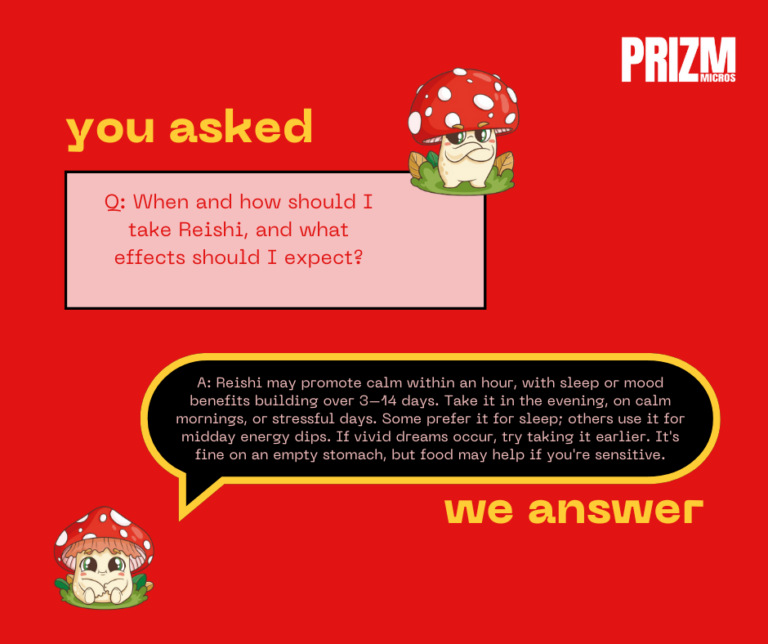
Some feel a calm within 30–60 minutes. Others notice sleep improvements or mood shifts after 3–14 days of daily use. Reishi is adaptogenic—its magic builds gradually, aligning your body’s systems over time.
When to Take It (And When Not To)
- Best for: Evening wind-downs, chill mornings, or high-stress days.
- Some users prefer PM for sleep support. Others say it helps smooth midday energy dips.
- Watch out: For a few people, taking Reishi too close to bedtime can cause vivid dreams or wakeups. Test your timing.
Should I Take Reishi on an Empty Stomach?
Totally fine, but if you’re sensitive, pair it with food—especially if you’re on a low-carb diet. Bonus: it might help reduce post-meal energy crashes.
How Long to Take It?
Consistency is key. Daily use is best for stress balance and immune modulation. Cycling isn’t typically necessary, but listen to your body and your schedule.
Is It Safe With Meds or Other Supplements?
Reishi is generally well-tolerated. That said:
- If you’re on SSRIs, ADHD meds, blood thinners, or immune-modulating drugs, talk to your doc.
- Be cautious combining with stimulants—Reishi may reduce the crash but could alter how you feel them.
Pro Tip: Stack It Smart
Pair Reishi with Lion’s Mane in the morning for focus + calm. Or blend it into a night ritual with magnesium and journaling. This isn’t about hacking—it’s about harmony.
Addressing the Big Questions (and Quiet Worries)
Let’s face it—most folks Googling “What do Reishi gummies do?” are wondering what it really feels like. Or whether they’ll waste their money. Or if they’re gonna end up wired at midnight. Let’s get into it.
“What Does It Feel Like When Reishi Kicks In?”
It’s subtle. Most users describe a lightness in the body, calm in the chest, or a sense that things just don’t bother them as much. It’s not trippy. It’s not sedating. Think: calm confidence.
“Why Do Reishi Gummies Mess With My Sleep?
Here’s the thing: Reishi is calming—but for some, especially newbies, it can stimulate vivid dreams or cause mid-sleep wakeups. If that’s you, shift your dose earlier in the day. Everyone’s biochemistry is different.
Are Reishi Gummies a Placebo?
Short answer: depends on the source. Poor-quality extracts? Yeah, probably. But third-party tested, fruiting body gummies (like PRIZM’s) contain legit levels of beta-glucans and triterpenes backed by research. Real ingredients = real outcomes.
Can Reishi Mess With My Blood Sugar?
Some users with hypoglycemia or carb sensitivity reported energy dips. But others said it actually smoothed their blood sugar curve. Start with a low dose and pair it with a meal if you’re unsure.
How Do I Know It’s Working?
You might notice:
- Less reactivity during stress
- Better quality sleep
- Fewer colds
- Mood lifts that sneak up on you
If you’re unsure, journal your baseline and re-check in two weeks
Real People, Real Impact—How Reishi Fits Into Daily Life
You’re not buying Reishi to earn a wellness badge—you want to feel better. Here’s how real people use Reishi gummies in the wild:
Wind-Down Rituals Without Wine
A dad in our PRIZM community takes one Reishi gummy post-bedtime stories, pre-Netflix. He used to reach for wine. Now? A calmer evening, deeper sleep, zero hangover.
Calmer Social Interactions
A creative director reported feeling “less tight-chested” during high-pressure meetings after two weeks of daily Reishi. It wasn’t dramatic—but it was exactly what she needed to stay grounded without zoning out.
Supporting Neurodivergent Focus
One customer with ADHD shared that Reishi helped her regulate emotions during overstimulating tasks. No jittery buzz—just a bit more ease getting through the to-do list without crashing mid-afternoon.
Festival Reset Tool
Microdosers at music festivals often stack Reishi with tryptamines or Lion’s Mane to soften overstimulation and extend the clarity. It’s the “warm blanket” in your mental rave kit.
Women Navigating Hormonal Shifts
We’ve heard from multiple customers who say their PMS irritability eased noticeably after adding Reishi to their supplement stack. Coincidence? Maybe. But when your mood evens out, you notice.
Travel Stress Armor
Red-eyes, airport chaos, and shifting time zones? Reishi can be your jet lag buffer—no sleep meds needed. One user swears by taking two gummies before every flight.
Bottom line: Reishi doesn’t shout. It whispers. And when you listen, you’ll notice—you’re just… more you. Balanced, rested, calm. That’s the PRIZM way.
How to Get the Most from Reishi Gummies
Taking Reishi isn’t like popping an ibuprofen. It’s about building balance over time. Here’s how to make it work for your life, your body, your vibe.
When Should You Take Reishi Gummies?
Evening is best for most folks—especially if your goal is sleep support or stress relief. But if you’re sensitive to vivid dreams or find yourself waking at 2 a.m., try your dose earlier in the day.
Empty Stomach vs. With Food?
Either works, but here’s the breakdown:
- Empty stomach = quicker onset
- With food = smoother absorption, gentler on digestion
Got gut sensitivity? Pair it with your favorite snack.
Daily or Cycled Use?
Reishi builds over time. Daily use delivers the best results—think 2 to 4 weeks for maximum benefits. No need to cycle unless you’re taking other adaptogens heavily.
Can You Stack Reishi with Other Stuff?
Yes—but be smart. Users often stack it with:
- Lion’s Mane (for focus)
- CBD or Ashwagandha (for added chill)
- Microdoses (to smooth the ride)
Just avoid stacking with alcohol or untested substances until you know how it works for you.
PRIZM’s Recommended Dosage
Start with one gummy per day. If you’re feeling good but want a little more calm or immune love, bump it to two. Always listen to your body—and if you’re unsure, talk to your healthcare provider.
H3: How Long Until You Notice Effects?
Some users feel a mood shift in days. Others need two weeks. Sleep quality, stress recovery, immune resilience—these are slow-building wins. Journal. Track. Reassess. Reishi isn’t a firework—it’s a steady flame.
Trust the process. Trust your body. Trust the mushroom.
So, Is It Just a Placebo? (Let’s Be Honest)
It’s a fair question—and a common one. We’ve heard it all:
“Are Reishi gummies legit or just expensive candy?”
“I don’t feel anything—are they even working?”
“Seems like wellness hype.”
Here’s the deal: Reishi works differently than a stimulant or a sedative. It’s not here to blow your socks off. It’s here to help your nervous system chill, your immune system stay on point, and your sleep feel deeper. Quiet wins—but real ones.
Signs It’s Actually Working
- You handle stress better—like, your boss drops a last-minute deadline and you don’t spiral.
- You sleep through the night without tossing and turning.
- You get through a tough week without crashing.
- Your mood levels out (your friends might notice before you do).
The Role of Quality and Extraction
Not all gummies are created equal. If you’re not getting results, the problem might be the product, not the mushroom.
Here’s what matters:
- Fruiting body extract (not just mycelium on grain)
- Verified beta-glucan and triterpene content
- Proper extraction (dual is best for Reishi)
- Third-party lab tests showing what’s inside (and what’s not)
Bottom line: If you’re using quality Reishi and not feeling the placebo, it means it’s probably working exactly as it should—subtly, steadily, and for the long haul.
Common Side Effects and Concerns (Let’s Talk Real Talk)
Even natural supplements come with questions—and sometimes side effects. Here’s what real users (and science) say about what to expect with Reishi.
Will It Mess with My Sleep?
Ironically, a mushroom known for sleep support can also make dreams wild. Some folks report:
- Vivid or lucid dreams
- Middle-of-the-night wake-ups
- Restlessness if taken too close to bedtime
Fix? Try moving your dose earlier. Think post-dinner instead of lights-out.
Can It Cause Energy Dips?
Reishi can subtly influence blood sugar and cortisol. If you:
- Have hypoglycemia
- Are sensitive to stimulants or adaptogens
…you might feel a little crashy at first.
Solution: Start low and pair with food. And always check with your healthcare provider if you’re managing a condition like diabetes.
Medication Interactions
Reishi may interact with:
- Blood thinners
- Immunosuppressants
- SSRIs or ADHD meds
No horror stories—but always play it safe. If you’re on medication, talk to your doc before adding Reishi to your routine.
Am I Just Imagining It?
Another honest worry. Reishi’s benefits are subtle. They’re felt more in what doesn’t happen:
- The meltdown that didn’t hit.
- The cold that never came.
- The sleepless night that became seven hours of peace.
The takeaway? Subtle doesn’t mean fake. With Reishi, “nothing” happening is sometimes the best sign something’s actually working.
When to Take Reishi Gummies (And How to Feel the Difference)
Timing matters. Like with meditation or green tea—get the rhythm right, and the benefits start to stack.
Best Time to Take Reishi Gummies
🌓 Evening (most popular):
- Promotes calm after a long day
- Supports deeper sleep
- Reduces that wired-but-tired feeling
🌞 Afternoon (also great):
- Helps avoid the 3PM crash
- Eases social tension or brain fog
- Smooth energy without the coffee crash
⛔ Right Before Bed (sometimes not ideal):
Some folks report vivid dreams or mid-sleep wakeups. If that’s you, try bumping your dose back an hour or two.
Should You Take It with Food?
Yes—especially if you’re sensitive. Reishi plays nice with a small meal or healthy fat. Empty stomach = faster absorption, but more potential for energy swings.
Can You Take It Every Day?
Absolutely. In fact, you should. Reishi builds in the body over time. Think of it like a long game—not a quick fix. Consistency is key.
Should You Cycle It?
Some users choose to take breaks every few weeks, but there’s no hard rule. If you’re feeling great and have no side effects? Keep going.
What If I’m Also Taking Caffeine or Alcohol?
Reishi may smooth the crash of caffeine. It’s often used to offset overstimulation.
As for alcohol—Reishi supports liver health, but it’s not a detox button. Be mindful if mixing.
Bottom line: Reishi plays well with others—but like any wellness ritual, it works best when you listen to your body.
Why Quality Matters (Not All Reishi Is Created Equal)
Let’s talk potency, not just promises. What’s on the label doesn’t always match what’s in the gummy—and with Reishi, that matters.
Fruiting Body vs. Mycelium on Grain
Here’s the deal:
- Fruiting body = actual mushroom cap. High in beta-glucans, triterpenes.
- Mycelium on grain = roots grown on oats or rice. Cheaper, but far less potent.
TL;DR? You want fruiting body. If it doesn’t say it on the label? Assume it’s not.
The Extraction Method Counts
Raw mushrooms aren’t enough—those actives are locked in chitin. So how do we get them out?
- Hot water extraction: unlocks beta-glucans
- Alcohol extraction: unlocks triterpenes (key for stress support)
The best products use dual extraction—both water and alcohol—to capture the full spectrum of benefits.
Look for 3rd-Party Testing
We’re talking:
- Verified beta-glucan content
- No heavy metals, pesticides, or mold
- Certificate of Analysis (COA)? Must-have.
It’s the difference between “maybe it works” and “hell yes, I feel this.”
What Else Is In Your Gummy?
Avoid:
- Gelatin (if vegan)
- Artificial sweeteners
- Hidden sugars or flavorings that mess with absorption
Prefer:
- Pectin-based gummies
- Organic ingredients
- Simple, clean labels
How to Use Reishi Gummies for Best Results (Timing, Dosage, and Hacks)
Alright, so you’ve got your hands on some high-quality Reishi gummies. Now what? Here’s how to actually use them to feel better, not just check a wellness box.
When Should You Take Them?
- Evening: Most common. Helps wind down, ease into sleep.
- Afternoon: For mid-day calm or a smooth post-lunch energy boost.
- Morning? Only if you’re pairing it with Lion’s Mane or need stress support for the day ahead.
With or Without Food?
- Best with food or right after. It supports absorption and minimizes any chance of a sugar dip (especially for those with carb sensitivity).
- Taking on an empty stomach? Some users do it—but start slow and watch how your body reacts.
How Long Until You Feel It?
- Short-term: Some feel calmer or sleepier within hours.
- Real magic: 7–14 days of daily use. It’s cumulative, not caffeine.
- Pro tip: Track how you don’t react to stress. That’s your Reishi at work.
Should You Cycle Reishi?
- Not required. It’s safe for long-term daily use.
- But if you’re stacking it with other adaptogens or nootropics? A few off-days a week may keep sensitivity high.
Stack Smart
Reishi plays well with:
- Lion’s Mane: for calm clarity
- L-Theanine or magnesium: for sleep stacking
- Legal microdoses: as a grounding agent for elevated states
Just don’t stack with anything intense unless you know your limits, especially if you’re using stimulants or SSRIs. Always consult a pro if unsure.
Reishi Gummy FAQs: Real Talk on What to Expect
Can I take Reishi on an empty stomach?
Yes, Reishi is generally well-tolerated on an empty stomach, especially in gummy form. However, if you’re sensitive or prone to nausea, having a small snack alongside your dose can help ease digestion.
Why does Reishi affect my dreams or sleep?
Reishi can calm the nervous system, leading to deeper sleep, but for some, it also intensifies dreams or causes nighttime wake-ups. If this happens, try taking it earlier in the evening or switching to morning use.
Does Reishi cause blood sugar crashes?
While Reishi has shown blood sugar-regulating potential, people with hypoglycemia or insulin sensitivity should monitor their response closely. If you feel lightheaded or foggy, consider taking it with food and talk to your doctor.
Is it safe to combine Reishi with other supplements or medications?
Generally, yes—but it’s smart to check in with your healthcare provider, especially if you’re on SSRIs, ADHD meds, blood thinners, or immunosuppressants. Reishi has immunomodulatory effects and could enhance or dampen your current regimen.
How do I know if it’s working, or if I’m just imagining it?
Unlike caffeine or nootropics, Reishi works in the background. You might not “feel” it kick in, but after 1–2 weeks of daily use, many users notice smoother mood, better sleep, or improved stamina during stress.
Final Thoughts: Built for Calm, Backed by Nature
Reishi gummies aren’t a miracle pill—and that’s the point. They’re a slow burn. A daily ritual. A way to support your nervous system, your immune strength, and your peace of mind without the spikes and crashes of quick-fix supplements.
At PRIZM, we built our Reishi blend for the long game. Real fruiting body extract. No sketchy fillers. Just clean, legal adaptogens that help you meet life with more balance, more presence, and more sleep (without zoning out).
If you’re ready to feel the difference—gently, but meaningfully—start your journey with Reishi the way we did: with curiosity, consistency, and something that actually tastes good.
👉 Explore PRIZM Reishi Gummies – Your daily dose of calm, crafted for clarity.
⚠️ Disclaimer
This product is not intended to diagnose, treat, cure, or prevent any disease. Always consult with your healthcare provider before starting any new supplement, especially if you are pregnant, nursing, or taking medication. Results may vary.
References
- Immune Support
Gao, Y., et al. (2004). Effects of Ganopoly® (a Ganoderma lucidum extract) on the immune function in advanced-stage cancer patients. Immunological Investigations, 33(2), 171–183.
https://doi.org/10.1081/IMM-120027816 - Stress & Cortisol Regulation
Wachtel-Galor, S., & Benzie, I.F.F. (2011). Ganoderma lucidum (Lingzhi), a Chinese medicinal mushroom: Biomarker responses in a controlled human supplementation study. The American Journal of Chinese Medicine, 39(6), 1123–1135.
https://doi.org/10.1142/S0192415X11009366 - Sleep Quality
Chen, N., et al. (2014). Effect of Ganoderma lucidum spore powder on insomnia in patients with neurasthenia: A randomized, double-blind, placebo-controlled trial. Chinese Journal of Integrative Medicine, 20(10), 716–720.
https://doi.org/10.1007/s11655-014-1894-y - Liver Function
Boh, B., et al. (2007). Ganoderma lucidum and its pharmaceutically active compounds. Biotechnology Annual Review, 13, 265–301.
https://doi.org/10.1016/S1387-2656(07)13010-6 - Adaptogenic Properties
Panossian, A., & Wikman, G. (2009). Effects of adaptogens on the central nervous system and the molecular mechanisms associated with their stress—protective activity. Pharmaceuticals, 2(1), 77–114.
https://doi.org/10.3390/ph2010077 - Cognitive & Mood Support
Tang, W., et al. (2006). Ganoderma lucidum: A potent pharmacological macrofungus. Current Medicinal Chemistry, 13(13), 1569–1585.
https://doi.org/10.2174/092986706776361036
Antioxidant Activity
Sanodiya, B.S., et al. (2009). Ganoderma lucidum: A potent pharmacological macrofungus. Current Pharmaceutical Biotechnology, 10(8), 717–742.
https://doi.org/10.2174/138920109789978757
